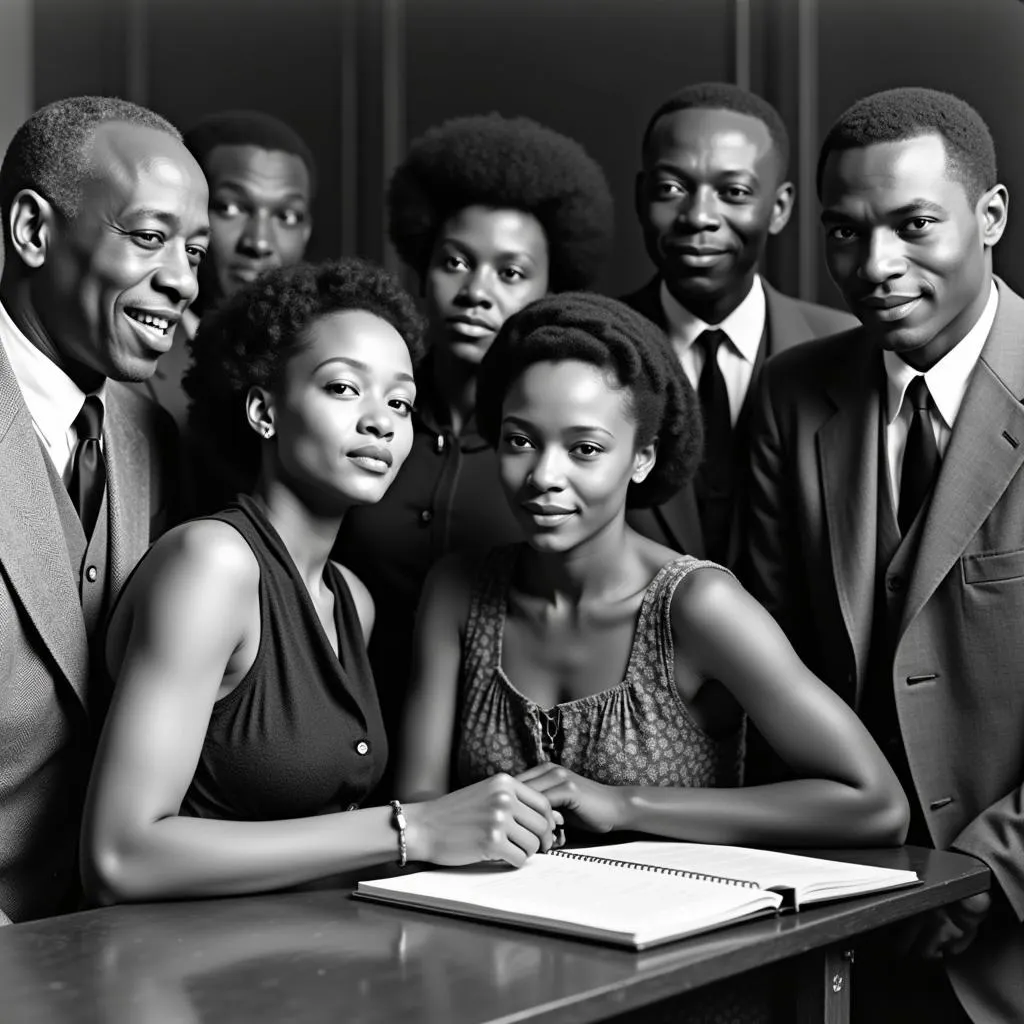Exploring the World of African American Writing Books
African American Writing Books hold a prominent place in the literary landscape, offering diverse voices, compelling stories, and profound insights into the Black experience. From the poignant narratives of slavery to the contemporary explorations of identity and race, these works have shaped American literature and continue to resonate with readers worldwide.
A Rich Literary Heritage
African American writing has a long and rich history, dating back to the 18th century with the publication of Phillis Wheatley’s poems. Throughout the years, Black authors have used their words to fight for freedom, justice, and equality, while also capturing the beauty and complexity of their culture.
Early Voices of Resilience
The antebellum period saw the emergence of slave narratives, powerful first-hand accounts of the horrors of slavery. Works like Frederick Douglass’s “Narrative of the Life of Frederick Douglass, an American Slave” and Harriet Jacobs’s “Incidents in the Life of a Slave Girl” exposed the brutality of the institution and fueled the abolitionist movement.
The Harlem Renaissance and Beyond
The Harlem Renaissance of the 1920s and 1930s marked a flourishing of African American art, music, and literature. Authors like Langston Hughes, Zora Neale Hurston, and Alain Locke gave voice to a new generation of Black Americans who were proud of their heritage and eager to express themselves creatively.
 African American Authors of the Harlem Renaissance
African American Authors of the Harlem Renaissance
The Civil Rights Era and Contemporary Voices
The Civil Rights Movement of the mid-20th century inspired a new wave of African American writing, focusing on themes of resistance, identity, and social change. Authors like James Baldwin, Toni Morrison, and Maya Angelou produced powerful works that challenged racial inequality and explored the complexities of Black life in America.
Genres and Themes in African American Writing Books
African American writing encompasses a wide range of genres, including fiction, non-fiction, poetry, drama, and memoir. Some common themes explored in these works include:
- Race and Identity: Exploring the complexities of racial identity, the legacy of slavery, and the ongoing struggle for equality.
- Family and Community: Celebrating the strength and resilience of Black families and communities, as well as the challenges they face.
- Social Justice: Addressing issues of racism, discrimination, and social inequality, and advocating for change.
- Love and Relationships: Depicting the full spectrum of human emotions, from the joys of love to the pain of heartbreak.
- Coming of Age: Exploring the challenges and triumphs of growing up Black in America.
Why Read African American Writing Books?
Reading African American writing books offers numerous benefits, including:
- Gaining new perspectives: African American literature provides a unique and valuable perspective on American history and culture.
- Expanding your understanding of race and racism: These works can help readers to better understand the complexities of race and racism, and to challenge their own biases.
- Connecting with characters and stories: African American writing books are filled with compelling characters and stories that will stay with you long after you finish reading.
- Celebrating Black culture and heritage: These works celebrate the richness and diversity of Black culture, from its music and art to its food and traditions.
 African American Woman Reading a Book
African American Woman Reading a Book
Finding Your Next Read
With so many amazing African American writing books to choose from, it can be overwhelming to know where to start. Here are a few tips for finding your next great read:
- Explore award-winning authors: Start with classics like Toni Morrison’s “Beloved” or James Baldwin’s “Go Tell It on the Mountain.”
- Check out contemporary voices: Authors like Colson Whitehead, Ta-Nehisi Coates, and Jesmyn Ward are writing some of the most important and engaging literature today.
- Visit your local bookstore or library: Ask for recommendations from librarians or booksellers who specialize in African American literature.
- Join a book club: This is a great way to discuss books with other readers and get new recommendations.
Conclusion
African American writing books offer a powerful and illuminating lens through which to view the world. By exploring these works, we can gain a deeper understanding of history, race, and the human experience. So, pick up a book today and start your journey of discovery.
FAQ
Q: What are some essential African American writing books?
A: There are countless essential works, but some must-reads include “Beloved” by Toni Morrison, “The Color Purple” by Alice Walker, “Invisible Man” by Ralph Ellison, and “Their Eyes Were Watching God” by Zora Neale Hurston.
Q: How can I support Black authors?
A: Buy their books, attend their readings, leave reviews, and recommend their work to others. You can also donate to organizations that support Black writers and publishers.
Q: Are African American writing books only for Black readers?
A: Absolutely not! These works offer valuable insights for readers of all backgrounds and are essential for understanding American literature and history.
Q: Where can I find more information about African American literature?
A: There are many online resources available, such as the African American Literature Book Club, the Schomburg Center for Research in Black Culture, and the National Museum of African American History and Culture.
 Diverse Collection of African American Literature
Diverse Collection of African American Literature
Need further assistance in exploring the world of African American writing books? Contact us at +255768904061, email kaka.mag@gmail.com, or visit us at Mbarali DC Mawindi, Kangaga, Tanzania. Our team is available 24/7 to assist you.

